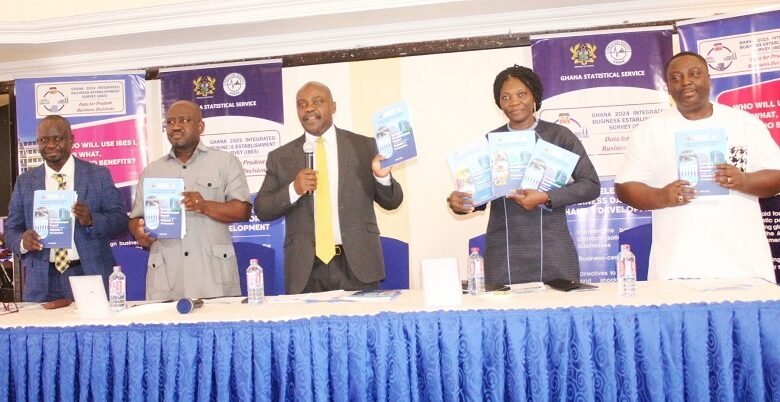
The country’s economy remains largely informal with about 92.3 per cent of businesses not registered, the Ghana 2024 Integrated Business Establishment Survey 1 (IBES 1) Report has revealed.
As of the end of 2024, the country has approximately 1.9 million establishments and 92.3 per cent, constituting 1.7 million establishments being micro-sized, operated informally and employed less than six people.
The 2024 IBES I reports, which comes in several volumes and an economic census, presents detailed statistics on business growth, employment trends, and sectoral distribution, building on data from the previous census conducted in 2014.
The report covering from 2014 to 2024 provides data on employment levels, revenue generation, and emerging business activities, including external trade, digital finance adoption and environmental sustainable practices.
The report further reveals that the business establishments engaged nearly seven million people and services remain the sector with the largest share of establishments.
Speaking at the launch in Accra yesterday, the Government Statistician, Professor Samuel K. Annim, emphasised that despite the expansion of businesses, informality remained a persistent challenge.
Prof. Annim explained that while Greater Accra, Upper East, and Upper West had seen an increase in informality, Central and Northern Regions were experiencing a gradual shift toward more formal business operations.
“The services sector continues to lead, accounting for 76.7 per cent of businesses; yet, its share has declined over the decade. It is followed by industry at 21.1 per cent and agriculture at 2.2 per cent,” Prof. Annim disclosed.
The Government Statistician stated that financial stability of businesses remained a challenge, and about 70 per cent of businesses accruing less than GH¢10,000 annually, and only 0.01 per cent exceed GH¢1 million.
Additionally, Prof. Annim said digital finance and sustainability were gaining traction and currently, 37.2 per cent of establishments use digital financial services, with adoption highest in Greater Accra (50.9 per cent) and lowest in Savannah (18.9 per cent).
The Chief Director of Ministry of Trade, Agribusiness and Industry, Noah Tumfo, in his remarks lauded the GSS for the report, saying that the data in the report would be useful tool in developing the policies of the Ministry.
“We will use the data from this exercise to help us target our policy and programmes to suit what we intend doing for the people of Ghana,” he mentioned.
Mr Tumfo stated that the data would help properly position the Small and Medium-sized Enterprises and also support the big agro industries.
The Treasurer of the Association of Ghana Industries, Raphael Ayitey, who chaired the programme, emphasised the importance of the IBES findings for shaping future business strategies.
“There is a growing demand for reliable and timely business data, frequently requested by policymakers and development partners. The lack of such data can lead to underestimating the information sector’s contribution to Gross Domestic Product and distort the structure of manufacturing and productivity over time,” he elaborated.
Mr Ayitey said with the insights from the IBES report, planners and policymakers could now have a clearer understanding of both the formal and informal sectors, paving the way for better-structured business operations in the future.
BY KINGSLEY ASARE







